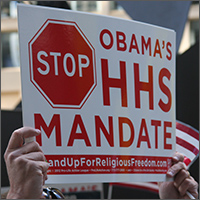
Considering how much time and resources the nation’s largest abortion chain put in to shilling for the Affordable Care Act/ACA/Obamacare, it’s no surprise that the ACA’s provision that employers—regardless of any conscientious objection—provide free contraception made the list.
Notice how Planned Parenthood framed it:
The ACA covers preventive care with no copay under all plans — meaning women get birth control with no out-of-pocket cost. Many women now have access to affordable birth control for the first time ever. There’s really only one response to that:
In other words: non-stop (literally!) frivolity. Beyond parody, that.
Note the subtext:
Women (and men) have a right to consequence-free sex, and if some people don’t like paying for your birth control, too bad for them. Let’s get this party started!
The Growing Hostility Toward Religious Freedom
In an excellent article titled “Sex, Drugs, and Religious Liberty” published earlier this week on Public Discourse, Carissa Mulder outlines several threats to individual religious freedom that have been publicized in recent years: e.g., various business owners—photographers, bakers, etc.,—who have run afoul of the law after refusing to have anything to do with same-sex “weddings,” and Christian nurses in New Jersey who were forced to assist with abortions.
She also mentions, of course, the HHS Mandate, to which Planned Parenthood believes the “only response” is to get up and dance.
Mulder then asks:
How did we get here? People commonly point to the gay rights movement. It is true that the clash between sexual license and religious liberty is most often seen in the context of gay rights. But step back for a moment. In a 2012 survey of 120,000 American adults, Gallup found that only 3.4 percent identified as LGBT. How could such a small minority so dramatically change prevailing opinion?
The answer may lie in [Douglas] Laycock’s statement: Americans resent religion’s perceived interference in their sex lives. The president of the Barna Group, an evangelical market research organization, recently observed that “Young people’s most common complaint . . . is that churches are too focused on sexual issues.” The consequences of same-sex marriage may pose the gravest threat to religious liberty, but the cultural conditions and assumptions that make that threat possible are rooted in heterosexual behavior.
This is a curious attitude, given that no religion in America has the legal ability to force anyone, adherent or not, to follow its teachings regarding sexual morality or anything else. An evangelical Christian can impregnate his girlfriend and keep his head firmly attached to his body, unlike the situation faced by Claudio in Measure for Measure. A Catholic can buy a package of condoms at the local drugstore. The clerk won’t ask to check his religious identification before ringing up the purchase. And women of any religious persuasion can obtain an abortion in all fifty states.
Why, then, does it seem that a growing number of Americans view religious liberty with suspicion, if not outright hostility? The problem is that many Americans are offended by the existence of an opposing view. The fact that someone, somewhere, dares to voice disapproval of their sexual behavior is, it now seems, offensive in and of itself. Studied non-judgmentalism is one of the hallmarks of contemporary American culture, with departures viewed as gauche at least or, more commonly, as an illegitimate attack on the sacrosanct individual. If you doubt this, please try telling a group of largely secular thirty-somethings that you believe cohabitation is wrong and see what response you receive.
Later, Mulder trenchantly notes:
To illustrate the degree of the incursion on religious conscience, religious liberty advocates often compare the contraception mandate to requiring all Jewish deli owners to serve pork sandwiches or requiring a Muslim business owner to pick up the tab for his employee’s heart-healthy red wine. This is a valid comparison, but perhaps the average American thinks, “Oh, the government would never do that.” And they’re right; probably the government never would. Why? Because food is considered too unimportant to be bothered with, whereas consequence-free sex has become an American totem.
Exactly. Although, of course, since nature bats last, the idea that sex can be free of consequences merely by willing it so is a siren song.
Safeguarding Religious Freedom for Employees and Employers

For decades, our nation has respected the First Amendment guaranteed freedom of employers by not forcing them to provide their employees with insurance coverage for services they believe are immoral. But now—since, historically speaking, five minutes ago—the Obama Administration has decided that individual employers should be stripped of this freedom.
Last summer, a Muslim teenager who worked at an Abercrombie & Fitch store in California was fired because she insisted on wearing a hijab while at work. She sued, claiming her individual religious freedom was violated. And, realizing they didn’t have a leg to stand on, A&F settled.
Just as this Muslim teenager—an employee—cannot be compelled to check her individual religious freedom at the door when she shows up to work, so too an employer cannot be compelled to check her religious freedom at the door when she shows up to work.

